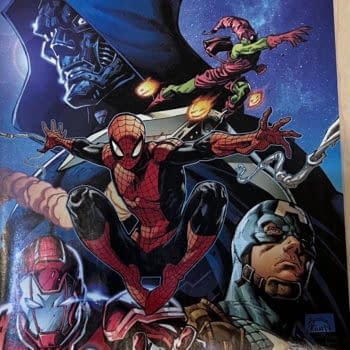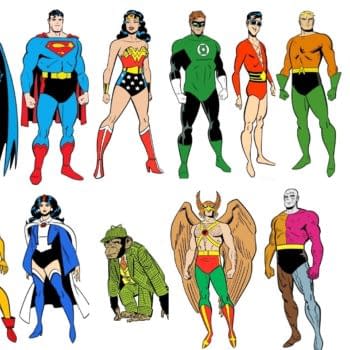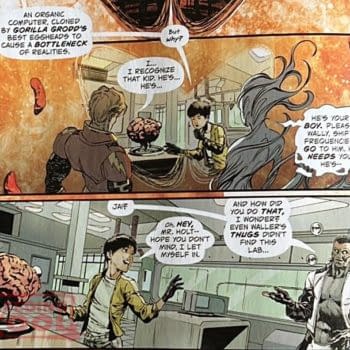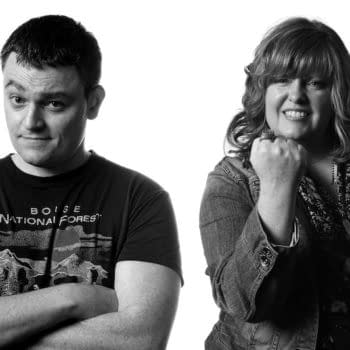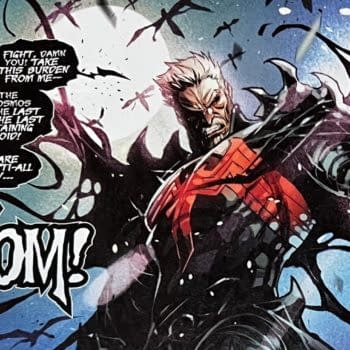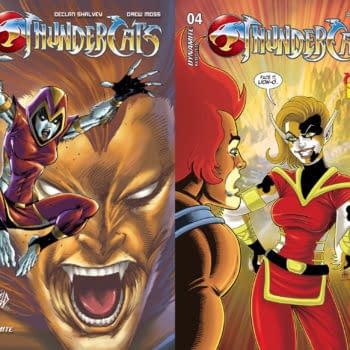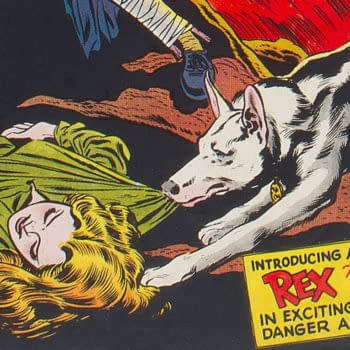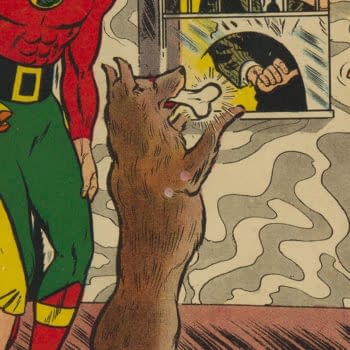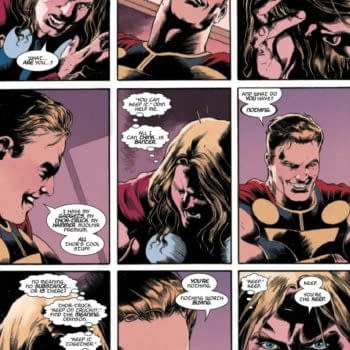Posted in: Comics | Tagged: android, angry birds, ap, entertainment, games, hasbro, ipad, rovio, transformers
John Byrne, The Fantastic Four And Racebending In Casting
There has, naturally, been some debate on Bleeding Cool message boards on the merits of racebending when casting roles in movies based on comic books from the sixties.
I now realize that "diversity" isn't a bad word, and choosing to look at the casting of a black actor in a traditionally white role as "marketing" is pretty cynical and defeatist. And it leaves out the more important point that we (folks who read and enjoy comic books) are not just white men aged 18-25 (though I've been on the forums here so maybe that age statistic should be more like 35-50). There are fans of color, just like there are female fans, just like there are LGBT fans and, Christ alive, it's 2014 and we're still having this discussion?
When you rant about the travesty of changing the race of Johnny Storm what you're really ranting about is the loss of your white privilege.
Whereas Hashim R. Hathaway said,
The number of original black heroes in their own films is scarce. Wesley Snipes has gone on record about the hell he had to go through to get Blade onto the big screen; while it was an achievement, and something that should've spawned even more…it hasn't.
Here's why I can't get behind Jordan as Johnny Storm: it's not enough. In fact, it's so "not enough" because what some, like Louis, would argue as a positive step only serves to highlight just how far away we are. Kate Mara, was cast as Sue Storm. Are they stepbrother and sister? Are they adopted siblings? Does it matter? In one way, it shouldn't matter at all, but in another way, the fact that it even has to be explained shows how diversity can be forced, because suddenly we have a token black guy on a team of white superheroes.
But there's one real trooper you need to recruit for such a discussion. The fellow who famously, during the casting of the first Fox Fantastic Four movie wrote,
Personal prejudice: Hispanic and Latino women with blond hair look like hookers to me, no matter how clean or "cute" they are. Somehow those skin tones that look so good with dark, dark hair just don't work for me with lighter shades.
That's right folks, it's John Byrne on his Forum, here to talk about race.
The other night, on his "news" show, John Oliver made a passing (and snarky) comment about people who get upset when non-White actors are cast as FICTIONAL CHARACTERS, (emphasis his)
This earned an epic eye roll from me, of course, and sent my tired old brain rumbling down pathways that are, by now, all too familiar.
This time, tho, I found myself landing in a spot I had not visited before. Of course I object to race-swapping in movies (which is something very different from "colorblind casting"), and I wondered how far Oliver would be comfortable going with his contempt for those who share my views. If, for instance, there was a remake of GONE WITH THE WIND, would it be perfectly acceptable to cast Will Smith as Rhett Butler?
Hollywood had noticed that the steady spread of VCRs and home entertainment systems, not to mention cable movie channels, meant more and more affluent White people were staying home to watch movies. More and more movie theaters were becoming the province of the less affluent, which Hollywood read as minorities, especially Black people.
So, once again something positive — a greater presence of minorities in movies — sprang from the Box Office, not any sort of desire by Hollywood to "do the right thing."
It is currently a fad in Hollywood — bordering on a fetish, it sometimes seems — to swap out White characters for other races and ethnicities. And I am frankly amazed that the Black community is not outraged by this patronizing modern version of blackface. Where are the roles created FOR Black actors? Why should Will Smith, Samuel L. Jackson, Halle Berry, etc, have to settle for table scraps?
I've always seen the argument for racebending white characters to be played by people of colour as that audiences seem to want to see big films based on older properties, which were created at a time when all the lead characters were white or they wouldn't be sold or distributed. So if you are going to make films of those characters, unless you want all your leads to be white, you may want to make changes. John Byrne has only one word to use for such an attitude.
This is, of course, a completely racist attitude. Or would it be okay to change a Black character into a White one, or an Asian one, or a Native American one, if the author who created the character was himself Black, and therefore using a "default" setting?
But it's not just cinema.
I've attended several local theater productions with race-swapping in the cast. A few years back, Shakespeare on the Sound did a week of OTHELLO, with a Black actor, naturally, in the lead, but also with a Black actor as Cassio. While this added an interesting layer to Othello's paranoia (does Desdemona just have a thing for Black guys?), it also took away the "stranger in a strange land" aspect of Othello's character. Instead of being THE Moor of Venice, he became but one of an unspecified number of Black people in the city.
A while later, I saw a small theater groups' production of ARSENIC AND OLD LACE, with a Black actor in the role of Jonathan Brewster. Now, aside from the problems this creates with the rest of his blood relatives being White, the character is described in the play, several times, as looking like Boris Karloff. At the very least, a bit of judicious script editing might have been applied?
This is, of course, why I maintain "colorblind casting" and "race swapping" are two different things. "Colorblind casting" applies when the race of the character is not known. James Earl Jones in THE HUNT FOR RED OCTOBER, for instance. "Race swapping" is when one known race is swapped out for another.
And from where I stand, race swapping is like treating a gangrenous leg by cutting off a toe. If there is a lack of roles, especially good roles, for "minority" players — and there most certainly IS! — then FIX THAT. Don't put a bandaid on it.
When it comes to casting a Black actor as Johnny Storm, there is a degree of historical ignorance at work that is insulting to Stan Lee and the memory of Jack Kirby.
Lee and Kirby, both New York Jews, did not "cast" the Fantastic Four as extensions of themselves. It took fifty years for a writer (and I wish it had been me!) to identify Ben Grimm as Jewish. But what Stan and Jack did when shaping the early Marvel Universe was demonstrate a social conscience in the best ways the Nation at the time would tolerate. And let us not forget, it was Stan and Jack who desegregated the American Armed Forces almost a decade before it happened in real life.
Lee, Kirby, Ditko and the rest introduced ethnic and racial minorities with a far greater frequency than, say, DC. Wyatt Wingfoot became a regular member of the FF's supporting cast. Robbie Robertson showed up in Spider-Man. The Black Panther arrived. Heroic non-White figures arose from the ranks of the common man. Remember Al B. Harper, who died to save the world?
When Johnny is race-swapped the inevitable response from some segments of fandom and the media is that this is "necessary" due to comics in the 1960s being hotbeds of White supremacy — while nothing is further from the truth. American comics had long been the home to some of the most liberal, forward thinking people you were likely to meet. They cannot be taken to task for portraying society as that society perceived itself. But they should definitely be lauded for being, often, ahead of the curve when it came to social reform.
Acting, actors will often tell us when at their most pretentious, is about TRUTH. There is no TRUTH in casting actors from races other than that of the character, and then pretending nothing else has changed.
White guys don't think they're being racist when they turn a White character Black, or Asian, or anything other than White, but they are. What many fail to understand is that distinguishing an individual (fictional or otherwise) purely on the basis of race is racist.Looking at a cast of characters and asking "Which one can we make Black?" turns being Black into nothing more than skin color. There is no consideration of the very different experiences Black people have in this country, and, indeed, in the World.If we took a story written by a Black African, set in Africa, about Africans, and arbitrarily turned one of the characters White, there would be (justifiable) outrage. The valid point would be made that we cannot simply "whitewash" a Black character and end up with the same person, the same dynamic, the same presence in the story.How is it any different to take a White character and paint him/her Black? Nick Fury, to cite but one example, had to turn into a different character when he was painted Black. Why not MAKE him a different character? Give him is own identity, instead of one handed down from on high by White folk? Make him Gabe Jones, or Gabe Jones Jr, or Gabe Jones III, if you want to tie into existing continuity. As the "Everything That's Wrong With…" site so aptly points out, Fury in the Marvel Movies has no depth at all. He is defined entirely by the eyepatch.And Samuel L. Jackson is okay with this?(As I have said before, I do not understand why Mr. Jackson did not sue Marvel when they used his likeness, without permission, as the "Ultimate" Nick Fury. His likeness is his brand. Does he feel no need to protect it? Can I make him a character in one of my STAR TREK photonovels and expect no letters from his lawyers? And if I got such a letter, could I not point to the Fury character, and his subsequent endorsement of it, and say "That ship has sailed!")
The sad fact is that civilians automatically perceive the movies as BETTER than the comics — usually without any knowledge of the comics. Recall the reviewers who praised Tim Burton's "vision" for Batman, apparently unaware that he was doing what Denny O'Neil, Neal Adams, Frank Miller and a host of others had been doing in the comics for decades. As far as the reviewers were concerned, Batman was Adam West.Comics are viewed with disdain, and comic FANS are viewed with disdain. (And given the kind of public representation we get, this is no small wonder.) Thus, if a fan speaks out against the excesses of Hollywood, said fan is immediately identifying himself as a feeble minded loser.But what's worse is when so-called fans themselves take this position, drinking the Hollywood Kool-Aid and making excuses for the transgressions. Magpies, I call them. As long as what's up on the screen is bright and shiny, anything is acceptable. (Oh, and if you can arrange for Wolverine to say "fuck," then you are a GENIUS!!)
When a property is fifty years old — take the X-Men, for instance — it is understandable that a moviemaker would want to confabulate as much as possible, rather than starting on the first page of the first issue. After all — X-Men again — most of the characters in that first issue would be unrecognizable to a modern comic fan audience.
Of course, this is where the weird part comes in. Hollywood will tell us that if every comic fan in America boycotted their latest effort, it would have almost zero effect on the Box Office — and yet they pander to those fans. But they do it in a halfassed way. So they'll throw in some "clever" reference that will get the fanboys swooning, while demolishing acres of property next door. "Hey, look! Juggernaut said 'Im the Juggernaut, bitch!' That's so cool? What? They got Kitty's powers wrong and the actor doesn't really look like Juggernaut (or Kitty)? So what! He said 'Im the Juggernaut, bitch!'"
And civilians, of course, care not.
Many changes that Hollywood makes are just out of laziness. It's easier to do it one way, rather than another. Race-swapping falls into this category. Rather than spending some time and effort on creating new Black characters — you know, actually respecting the history and heritage of the Black actors who will play them — just get out the shoe polish and go all Al Jolson on an existing character.
It was racist when Jolson did it.* It's still racist. Only now, that racism has been repackaged in a way that makes some people think something POSITIVE is happening.
It isn't.
____________
* From time to time I have wondered how Jolson, who was born Asa Yoelson, would have reacted to a song-and-dance man who sported a huge beaked nose and a yarmulke. Would that horrifying cliché have been as "okay" as his own blackface routines?
Sometimes it doesn't even take race or gender swapping to create such a schism. Consider Storm, as we met her in GIANT-SIZED X-MEN 1:
Mysterious, ancient, unworldly. . . but within a very short time she was born in Harlem and grew up with the first part of Modesty Blaise's origin. A completely different character (and tied to a specific bit of world history, the Suez crisis, that makes her my age!!).
Coulson was not only a new character, but a White one. Since he is effectively the face of SHIELD, why not make him Black?
Do check the original posts for full context and further discussion. I get the feeling it may be continuing on these boards as well. And thanks to Bleeding Cool forum poster pacino for the cutting and pasting…







